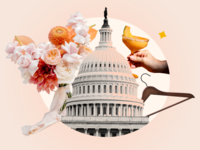Why You Shouldn't Skip Out on Wedding Insurance Coverage

Though you might not want to think about it, disasters and unexpected problems can strike on your wedding day. From a sudden cancellation to a damaged gown, wedding insurance can help protect you against the unforeseen while also giving you peace of mind. But what is wedding insurance and where do you buy it? That's exactly what we're here to answer (and more). We spoke to insurance experts to get the inside scoop on how much wedding insurance costs, what it covers, how to decide if you need it and wedding insurance companies to consider. Plus, we explain how to talk to your vendors about wedding liability insurance once you've hired your team of pros on The Knot Vendor Marketplace. Here's everything you need to know about wedding day insurance and why it's worth adding this important step to your wedding planning checklist.
What to know about wedding insurance: What Is It? | Coverage | Types | Is It Worth It? | How to Decide If You Need It | When to Get It | Providers | Tips
What Is Wedding Insurance?
Wedding insurance is a contractual, financial agreement that protects you against monetary losses in the event that your wedding day is unexpectedly canceled or otherwise affected by something out of your control.
Similar to other types of insurance policies (i.e. health, homeowners, car), you pay a fee for wedding insurance upfront in exchange for possible reimbursement from the insurance company if something goes wrong. According to Todd Shasha, Senior Managing Director of Personal Insurance Product Management at Travelers Insurance, wedding insurance is a type of special event insurance that provides coverage before and leading up to the wedding. Weddings are a significant investment—that's why wedding insurance is beneficial no matter how much your wedding costs. Wedding day insurance protects a couple's investment from circumstances beyond their control and gives you the option to be reimbursed for expenses incurred.
What Does Wedding Insurance Cover?
Exact areas of coverage depend on the specific policy, but in general, wedding insurance covers the wedding venue, vendors, wedding items and sickness or injury before or during the wedding day.
There's usually a specified maximum amount, which can be claimed under each section of your policy, and a deductible also applies. Steve Lauro, Vice President at Aon and the program manager of WedSafe, wants couples to know that exactly what wedding insurance covers will depend on the company. "All types of insurance vary, not only from company to company, but from state to state. Insurance in the U.S. is governed by each state's Department of Insurance." Lauro encourages couples to "find a reputable company who specializes in the type of coverage they are seeking, for example, a program dedicated specifically to wedding insurance. Make certain to inquire about what products and benefits are right for you."
Here's a brief description of each item wedding insurance companies usually offer coverage for:
- Site: Wedding insurance can cover the cost arising out of an unavoidable cancellation, such as damage or inaccessibility to the ceremony site—for example, if your reception hall can't honor your reservation because it has burned in a fire, experienced an electrical outage or closed down. Sometimes, this policy also covers the rehearsal dinner site.
- Weather: Extreme weather conditions and acts of God (hurricanes, earthquakes, wildfires) that prevent the couple, immediate family, wedding party members or the majority of the guests from reaching the premises where the wedding is to take place. Insurance may cover rescheduling the wedding and all the details involved, including ceremony flowers, tent rental and reception food. Keep in mind that in most states, an extreme weather policy must be purchased at least 14 days before the event.
- Vendor no-show: What if essential wedding people—the caterer or the officiant, for example—fail to show up? A wedding insurance policy usually covers the cancellation or postponement of the wedding for these reasons, including deposits paid to vendors who don't fulfill their contractual obligations.
- Sudden illness or injury: Wedding insurance may cover sudden illness, injury or death for the couple or immediate family members (parents, siblings, grandparents and children). This doesn't include pre-existing medical conditions, so it's best to speak with your insurance agent for more information.
- Wedding gifts: Some wedding insurance policies cover damage or theft of wedding gifts up to an estimated value amount.
As for what wedding insurance doesn't cover? In most situations, you won't be reimbursed if you call off the wedding because of a change of heart—in other words, getting cold feet doesn't count. According to Wedsure director of operations and Chartered Property Casualty Underwriter (CPCU) Kerri McDonald, Wedsure does offer change of heart coverage, but it must be purchased 15 months in advance. And while your wedding insurance policy might cover your wedding rings, an engagement ring probably won't fall under the same coverage. You can purchase engagement ring insurance separately or see if it's an optional addition to your homeowners insurance policy.
Types of Wedding Insurance
There are two main types of wedding insurance, and they don't exactly cover the same things, so it's important to know the difference. Here's a quick rundown to help you decide which type of policy is best for your needs.
Wedding Liability Insurance
"Liability insurance protects you against financial liability arising from your wedding, [and it's] required by many venues," Lauro explains. "This could protect you if a guest was injured, the venue was damaged or there is an alcohol-related incident." If a venue doesn't have its own insurance, liability insurance is a must, because you don't want to be held responsible for any accidents––especially if you're serving alcohol at your wedding. (One example: If a guest injures themself at your wedding while under the influence, liability insurance will cover their medical bills so you're not held responsible.) Rehearsal dinners are not always covered but can sometimes be added to a wedding venue insurance policy.
Wedding Cancellation Insurance
"Wedding event cancellation and postponement protects your financial investment in your wedding; covers cancellation or postponement, lost deposits, and more," says Lauro. "If circumstances beyond your control force the cancellation of the wedding, this coverage could reimburse you up to the total cost of your wedding. The reasons could be virtually anything from severe weather or the venue closing to an injury or illness of a person integral to your wedding. Wedding cancellation insurance coverage can usually extend to no-show vendors too.
Wedding Insurance Cost
So how much is wedding insurance? For a basic policy, the cost usually runs anywhere from $75 to $550, depending on the provider, the event location and the amount of coverage you want. General liability insurance depends on the limit of liability selected, which usually covers up to $1 million for accidents, and costs around $185.
"Event cancellation coverage is based on the price of the wedding the couple wants to protect," says Lauro. "Couples should choose a coverage level based on their total wedding budget. This is the investment you would stand to lose in a worst-case scenario." Overall, wedding insurance costs vary because of numerous factors, so research a few different policies to find the best one for your wedding. And remember, wedding insurance isn't just for the to-be-weds. "The mother of the bride or the father of the groom can buy policies too. Anybody who might have a financial interest in the wedding can purchase a policy," Shasha says.
Pro tip: To get a wedding budget estimate, use our free wedding budget tool. This will help you explore wedding insurance costs across various companies.
Is Wedding Insurance Worth It?
Although it comes with a price, the peace of mind you'll get from wedding insurance can make it a worthy investment, especially if you're getting married in a high-risk area or worried about things that are out of your control. "[Wedding insurance] offers peace of mind," says McDonald. "You cover your car, your house and have health insurance, so your wedding should be covered too."
Before you buy wedding insurance, chat with each of your vendors to see how well they're covered through their own insurance policies (which they should have as a registered business). You wouldn't want to pay for overlapping coverage out of your own pocket, so ask your vendors for a copy of their policy and then figure out where you aren't fully covered. Another reason you should get a copy of your vendors' insurance policies is that you may need to provide the certificates of insurance (COI) for the wedding venue's records.
Do You Need Wedding Insurance? Scenarios to Help You Decide
When you're already juggling so many expenses for your wedding budget, it can be tempting to skip out on wedding insurance to save a little bit of money. But wedding insurance can save you in all different types of situations, including some scenarios that we've outlined below.
- Jordan and Blake spent months planning their winter wedding. But on the wedding day, their reception site is made inaccessible by an ice storm. With the right wedding insurance policy, the couple can postpone their wedding and receive every penny they lost—including money for the invites, cake, catering, attire and nonrefundable deposits for ceremony musicians, a floral designer and other vendors.
- The bride's father is injured in a car accident just before the wedding and cannot travel. With wedding insurance, if the couple has to postpone their wedding, they could be paid back their expenses to enable them to have the wedding when the father recovers.
- Right before the ceremony, Brittany's gown catches a gust of wind. Unfortunately, the tulle dances over Uncle Howard's cigar and the dress instantly goes up in flames. Fortunately, the right insurance policy covers the replacement of the veil and gown.
- An unprecedented global pandemic creates undue economic hardship, limits all air travel and results in laws banning large gatherings. Wedding insurance can protect the costs paid for your ceremony from similar extraordinary circumstances beyond your control.
How Close to the Wedding Can You Get Insurance?
The best time to begin researching wedding insurance is shortly after you start planning, once you have an idea of how much each vendor's services will cost. Depending on the provider, you can purchase wedding insurance up to a few weeks before the wedding, but the sooner, the better.
"My recommendation is to make sure you have coverage in place as soon as you start outlining deposits," says Shasha. "A lot of customers might buy a policy up to two years in advance. That way, as your deposits go up, you can start writing checks and have coverage."
McDonald also thinks it's vital to get wedding insurance as soon as possible because the wedding industry traditionally uses nonrefundable contracts. McDonald advises insuring those nonrefundable deposits as soon as you and your partner start planning. For example, let's say you sign a contract and pay your wedding photographer a year before the wedding, and one month before the wedding, they drop out. If you buy a wedding insurance policy after the fact, you won't have coverage. That's why it's important to have an insurance policy in place even before you sign a contract or make final decisions.
Wedding Insurance Companies to Consider
It's important to shop around to find the best wedding insurance plan and price for your needs. The good news is that you might already work with one of these popular wedding insurance providers, but either way, here are just a few companies we'd recommend.
eWed Insurance
eWed Insurance offers three types of insurance to fit a variety of needs. Their event liability coverage starts at $119, comes with zero deductible and includes up to $2,000,000 per occurrence and $3,000,000 total for bodily injury and property damage. The company's cancellation insurance starts at $75 and protects against unforeseen circumstances like extreme weather, unanticipated illness and unexpected military deployment. Lastly, eWed's vendor day-of liability insurance, which works from a variety of vendor categories, starts at $75 and comes with zero deductible.
BriteCo
BriteCo wedding insurance is perfect for busy couples as they impressively promise to provide "jewelry and wedding protections in under 2 minutes." The company is also a good option if you want to house multiple wedding-related insurance plans in one place. They offer jewelry insurance (with up to 125% of replacement value coverage with no deductible), engagement ring insurance and wedding/event insurance (with plans starting below $80).
Travelers
Travelers wedding insurance plans begin at $160 without a deductible. Areas of coverage include wedding dress insurance, jewelry, wedding gifts, lost security deposits, cancellation or postponement, wedding photography and videography, as well as optional add-ons, including weather, liability, sudden illness and active call of duty.
WedSafe
Established in 1999, WedSafe has 25 years of experience offering wedding liability insurance and wedding cancellation insurance. In addition to providing insurance for couples, wedding vendors and entertainers can also purchase WedSafe insurance for professional use.
Wedsure
Need last-minute wedding insurance? Wedsure allows you to buy insurance up to 24 hours before your wedding, and you'll receive policy documents immediately following your purchase. Plans start at $125 and include coverage for your wedding rehearsal dinner, ceremony and reception.
Geico
With plans ranging from $75 to $235, Geico wedding insurance is an affordable choice if you want to add protection without going over budget. Choose from wedding liability insurance, cancellation insurance or save 15% by combining both plans.
Progressive
Progressive wedding insurance plans begin at $105, making them another affordable wedding insurance provider. Depending on the policy you choose, you'll be covered for liabilities, cancellations and damages to property, like wedding attire, jewelry or gifts.
Allstate
Allstate partners with Markel wedding insurance to provide policies as low as $75. Their event liability insurance, which protects you in the event of property damage or injury at the venue, includes up to $2 million in coverage and vendors can be added to the policy for free, which is helpful if you need wedding photographer insurance or wedding planner insurance. Their event cancellation insurance protects you against vendor bankruptcy, extreme weather and sudden illness.
USAA
USAA also partners with Markel wedding insurance to provide coverage exclusively for veterans and military families. They're one of the few wedding insurance companies offering destination wedding insurance, with coverage available for weddings taking place in (or on cruise ships departing from) Mexico, the United Kingdom, the Bahamas, Bermuda and more. USAA wedding insurance plans range from $75 to $235 and you can get a quote by logging into your USAA account.
Wedding Insurance Tips
Now that we've covered the logistics and technicalities of wedding insurance, here are a few final words of wisdom.
Take your time making a decision.
Just like any other wedding planning decision, do your research before committing to a wedding insurance provider or policy. It's tempting to make a quick decision so you can move onto the next checklist item, but be sure to read the fine print carefully to understand exactly what you're paying for—and exactly what's included in the policy.
Ask your wedding vendors for recommendations.
If you're having trouble deciding between wedding insurance providers or don't know where to begin, ask the people who do this for a living: your wedding vendors. Chances are, they'll be able to share pros and cons from their personal experience, whether through insuring their own business or what they've witnessed with previous couples choosing wedding insurance.
Check your existing insurance policies first.
This isn't always the case, but some homeowners or renters insurance policies may already include event insurance or wedding coverage, especially if you're hosting the wedding at home. Depending on the plan, you might need to add additional wedding coverage areas.
Purchase policies for anyone paying for the wedding.
If you have parents or other loved ones helping you pay for the wedding, it's a good idea for everyone to purchase their own wedding insurance plan. That way, you can outline the specific areas of coverage depending on how much each person is contributing financially.
Samantha Iacia and Hannah Nowack contributed to the reporting of this article.
Please note: The Knot and the materials and information it contains are not intended to, and do not constitute, financial or tax advice and should not be used as such. You should always consult with your financial and tax advisors about your specific circumstances. This information contained herein is not necessarily exhaustive, complete, accurate or up to date and we undertake no responsibility to update. In addition, we do not take responsibility for information contained in any external links, over which we have no control.




















